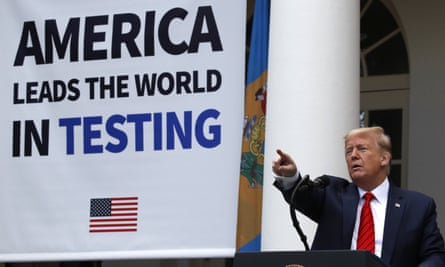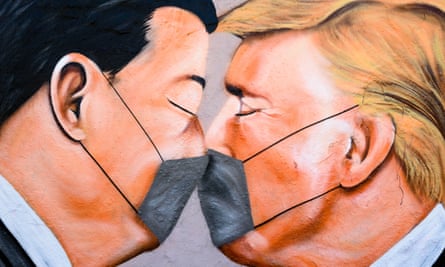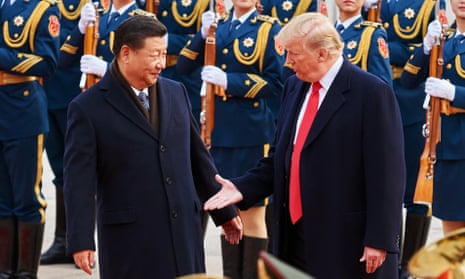United States
Foreign policy does not usually draw much attention in US election campaigns. It was given a few token minutes in the Democratic primary debates. But that was before coronavirus.
Anti-China sentiment is now the primary fuel of Donald Trump’s re-election effort, in the absence of a workable alternative. It will be increasingly hard to run on the economy, as the president had hoped, or on the administration’s pandemic response, as the human cost of the debacle becomes clear. Sinophobia has proven all the more attractive an option as it claims to explain both failures.
“Unfortunately, this is sometimes the tunnelling logic of democratic systems,” Jude Blanchette, a China expert at the Center for Strategic and International Studies, said. “Even if it comes with pretty significant national collateral damage, when it comes down to political survival the bad drives out the good.”
On Friday, Trump supporters in the America First Action committee launched a new wave of attack ads in the swing states of Michigan, Wisconsin and Pennsylvania, framing the Democratic challenger as “Beijing Biden”, using selective edits of the former vice-president’s past remarks and Chinese-language commentary praising the “Toast of China”.
The Biden camp has aired some similar ads of its own, drawing on Trump’s sometimes unctuous admiration for Xi Jinping, and his initially warm praise for China for its pandemic response.
The record of the two candidates offers deep reservoirs of material. They have both been complimentary towards a powerful trading partner with an appalling human rights record – though Trump’s fawning over Xi is in a different league – and both have children in business, Hunter Biden and Ivanka Trump, who have used their fathers’ coat-tails to acquire preferential treatment from Beijing.
The assumption – shared by both campaigns – that any association with China is electoral poison is supported by the figures. A Pew Research poll published last month found that two-thirds of Americans had a negative view of China; that distrust is likely to have deepened since then, as the Trump administration has insisted on Chinese responsibility for the pandemic.
Against that backdrop, the campaign has become a bidding war for the most hawkish China policies, with the president instinctively heading last week straight for the extreme end of the argument.
“We could cut off the whole relationship,” Trump told Fox News, claiming – without any hint of an explanation – that such a drastic decoupling would save the US $500bn.
As the incumbent, he will be expected to match his rhetoric with actions, so the heated battle of a bitter election is likely to have significant effects on US-China relations, which could in turn have a devastating impact on the global economy and on hopes for multilateral cooperation, while boosting the small but growing risks of conflict.
“All the signs suggest that the administration will be willing to go quite a bit further than it already has to try to shift blame on China for the pandemic, and to pursue policies that will portray it as hard-edged on China. And the central reason for that is that the alternative is that the president accepts blame on himself for his own domestic and international governance failings,” said Mira Rapp-Hooper, an expert on security in the Asia-Pacific region at the Council on Foreign Relations.
“It’s not clear to me how this ends up,” Kurt Campbell, former assistant secretary of state for East Asia and Pacific affairs, said. “I actually think right now that both the American and Chinese standing have been hurt on the global stage. And it feels like we’re fighting while Rome burns.”
Several analysts have talked about a new “cold war” between the world’s two biggest economies, but Campbell – who now runs a business consultancy and capital management firm called the Asia Group – argued that this great power rivalry will be even messier because they have become so integrated over the past three decades.
“I don’t like the framework of the cold war, because it suggests going back to something in the past. And the peculiarities of the US-Soviet relationship were such that we had very little connection, very little understanding with one another, very little travel, very little trade,” he said.
“The US-China relationship is probably the most interconnected relationship on the planet, in terms of investment and manufacturing. So to do surgery on these conjoined twins would be incredibly difficult.”
That has not stopped the Trump administration from picking up a scalpel and making a start on “decoupling”.
The “phase one” trade deal signed in January was a vague document that did little to resolve the trade tensions between the two countries. Now, its optimistic spirit, and the idea that there might be a “phase two”, is a fading memory.
The Trump administration is contemplating a series of punitive measures against China in retaliation for its failure to contain the pandemic. Options reportedly range from suing Chinese officials to skipping some repayment obligations on the $1tn the US owes China.

Among the likely US measures are more sanctions, particularly on the hi-tech sector, more determined efforts to lock the Chinese communications giant Huawei out of western markets, and pressure on US companies to move their supply chain out of China.
Hawks in the administration and in Congress are even talking about a US withdrawal from the embattled World Trade Organization. They see China’s entry into the WTO in 2001 as the original sin underlying America’s industrial decline.
Most regional experts believe that the danger of a military confrontation remains remote, but both the US and China are building up arsenals. And the heat of nationalist sentiment will make it all the harder to control any incident in regions where their armed forces converge, such as the Taiwan Strait and South China Sea.
Julian Borger
China
This week, President Xi Jinping will preside over the delayed opening of China’s annual brief session of its “parliament”, the National People’s Congress, a gathering of high pomp, long stretches of stifling boredom, but great political significance.
The legislature itself is just a rubber stamp, but the government uses the two weeks it is in session to unveil economic and defence targets, shuffle top officials and publish new policies.
For decades, it had met in March, until Covid-19 upended life in China. Its reconvening is the latest official signal that the country is back on track, a celebration of Beijing’s – and by extension Xi’s – victory over the virus.

But alongside celebration of Chinese success, the ceremonies and speeches are likely to draw pointed contrasts with the deadly failures of western democracies, particularly China’s biggest trading partner and rival, the United States of America.
The communist leadership has been cultivating nationalism for many years: it was a convenient ideology to unify an officially atheist country as economic growth started to slow. But as China emerged from its virus hell, a particularly ugly strain of the ideology emerged. It has found expression in many ways, from a top diplomat peddling conspiracy theories that the US brought Covid-19 to Wuhan, to racist attacks on Africans in the streets of a major city.
In Hong Kong, 15 activists were arrested in the biggest crackdown on the city’s pro-democracy movement since the outbreak of mass protests last year. There have been bellicose editorials threatening Taiwan in state media.
The malevolent triumphalism was summed up in a banner hung by one restaurant in the northern city of Shenyang. In March, diners at Mother Yang’s ’’were invited to “Enthusiastically celebrate the coronavirus in America; wish the virus a long and successful journey in Japan”.
The message was quoted by Geremie Barmé, in his translation of an essay warning of an escalation in aggressively anti-western nationalism by the intellectual and former diplomat Zi Zhongyun.
“Who could have guessed that things would get exponentially worse during the coronavirus epidemic? Numerous absurd rumours have been doing the rounds, although they all feed into one overriding sentiment to ‘bolster China and disparage the west’,” she wrote, comparing the current political climate with that of the Boxer rebellion, a disastrous wave of violent anti-western nationalism in 1900.
More people have now died from the virus in the US than have been infected in China, at least going by official data. Chinese citizens abroad are flocking home – or trying to. Their fury at being stranded is a new, unexpected problem.
But the narrative of unmatched Chinese success in disease control relies on ignoring the cover-ups and missteps that allowed the disease to spread so far, the death of the whistleblower doctor Li Wenliang and the chaos that engulfed Wuhan at the peak of its crisis. Public anger about these failings may have been silenced as the party reshapes the narrative but it has not totally vanished; and the economy was dealt a heavy blow.
“A lot of regime legitimacy has come from increased prosperity. After the economy started to slow down [in recent years], it became more nationalistic to help compensate for that,” said Ho-Fung Hung, professor in political economy at Johns Hopkins University. “Now, with coronavirus, the legitimacy problem has become more serious, so they have doubled down on aggressive nationalism.”
Across the Pacific, Xi faces an increasingly belligerent Trump. Stirring up fears of an outside threat, an enemy against which to mobilise, is a time-honoured method of building political support. Trump has an election to contest in less than six months; and, while Xi does not face such a public test, he still seeks legitimacy to bolster his government.
“China’s attacks on the US were to be expected, given the geopolitical tension between the countries,” Andrew Small wrote in a recent paper for the European Council on Foreign Relations. “But Beijing also appeared to have decided to instrumentalise Europe, at a moment of deep internal strain, in a broad information battle over the supposed inadequacies of western democracy. It was not enough to argue that the Chinese Communist Party had succeeded; others had to be seen to fail.”
Xi’s triumph may not be all it seems, however, because although he has steered China out of the first stages of the coronavirus, he now has to lead the country through the economic wreckage left behind.
And while the Chinese population can perhaps be protected from re-contagion by shutting the country’s borders, its economy grew on the back of globalisation and cannot be so easily sealed off.
Even before Covid-19 emerged, Xi was facing a cocktail of serious economic challenges, including high debt, low productivity and the fastest ageing population in the world. In the virus’s wake, China has registered the slowest growth rate in more than four decades and unofficial estimates suggest that unemployment has climbed to 10% or more.
In trying to solve these problems, China may find that its aggressive nationalism proves a costly tactic, even in a world where Trump has abdicated America’s position of global leadership. “China will have a chance to displace US influence in many places, but it’s a globalised world,” Hung said. “My judgment is that China overreached and alienated too many people and, in the end, it will backfire on the economy when countries … try to find other places to invest or move their production facilities.”
Emma Graham-Harrison
